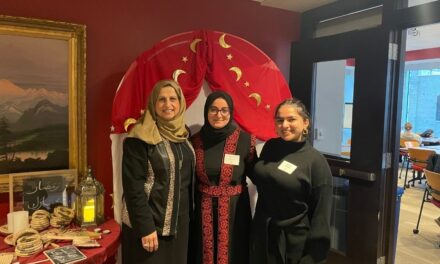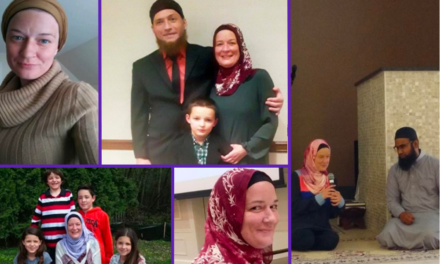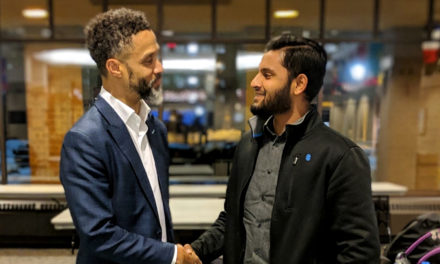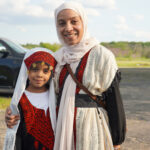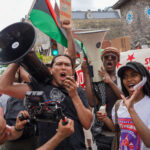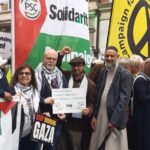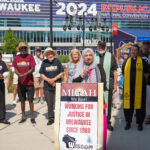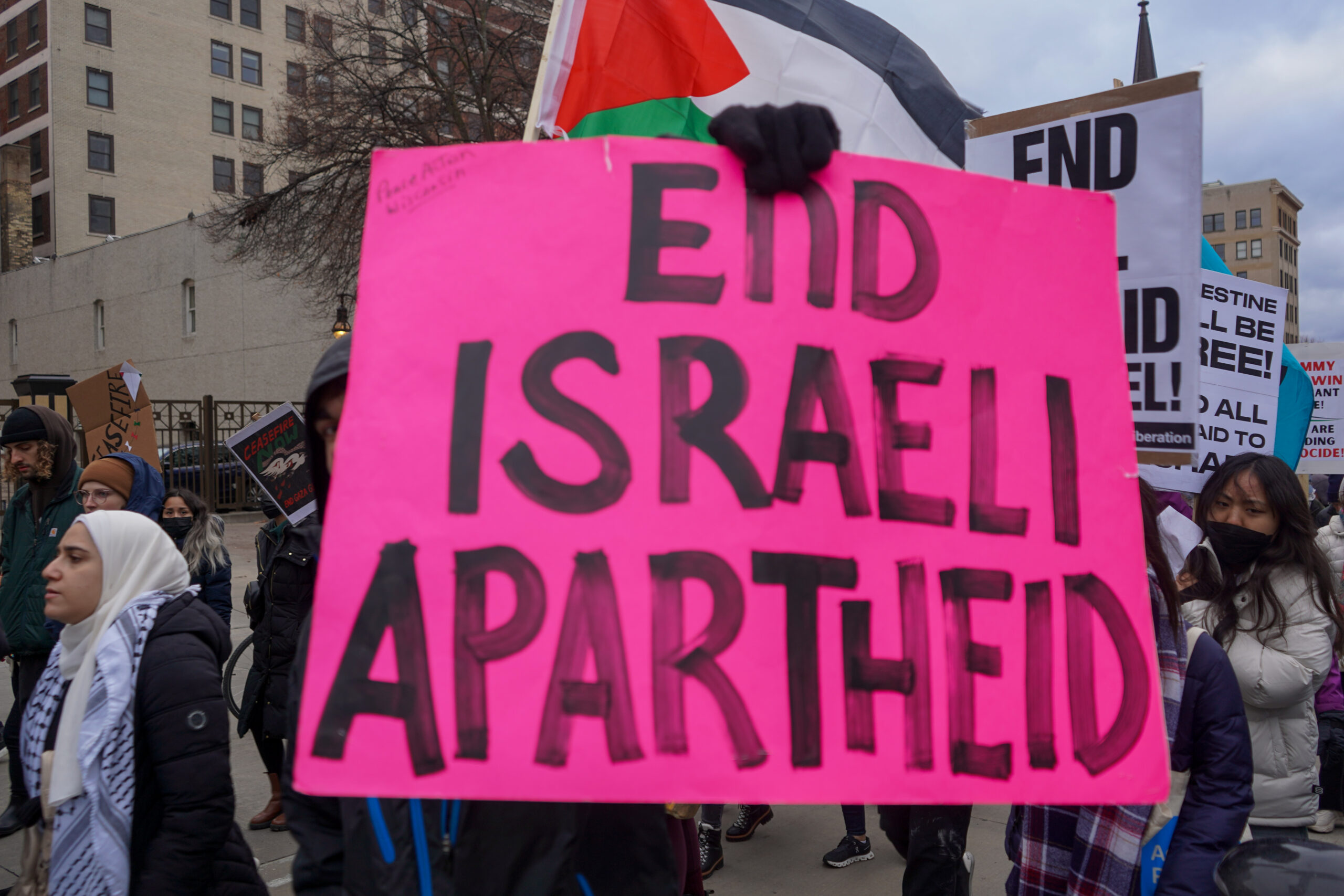
Photo by Kamal Moon
Many activists and human rights groups around the world are demonstrating support of Palestine like this group from the Wisconsin Coalition for Justice in Palestine at the Wisconsin state capitol on Dec 9.
This article was originally published by Middle East Eye on Jan 4 by Umar A Farooq:
South Africa embroiled itself into a major legal battle with Israel when it filed a petition at the International Court of Justice and called on the body to investigate whether Israel was committing genocide against Palestinians since it began its latest assault on Gaza.
The 84-page application is the most significant call for Israel’s actions to be labelled a genocide, and comes as the Palestinian death toll in Gaza nears 23,000, with the majority of the recorded fatalities being women and children.
The application says Israel’s actions are “genocidal in character because they are intended to bring about the destruction of a substantial part of the Palestinian national, racial and ethnical group.”
Israel has rejected the filing, calling it a “blood libel” – a reference to antisemitic lies that originated in the Middle Ages that Jews murdered Christian boys to use their blood for religious rituals.
Middle East Eye has broken down the application’s main points and explains what impact a decision from the international court could have.
What is the reason behind the filing?
South Africa has for decades backed the Palestinian cause for statehood both domestically, and internationally including at the United Nations. South Africa likens the treatment of Palestinians living under occupation to the treatment of its Black citizens during the apartheid era.
Several leading international human rights groups have made a similar comparison, and categorised Israel’s treatment of Palestinians as apartheid, a label that Israel vociferously rejects.
In its application to the ICJ, South Africa cites this treatment of Palestinians prior to the latest war as a preliminary factor to what it describes as an ongoing genocide.
“Against a background of apartheid, expulsion, ethnic cleansing, annexation, occupation, discrimination, and the ongoing denial of the right of the Palestinian people to self-determination — Israel, since 7 October 2023 in particular, has failed to prevent genocide,” the application says.
South Africa also said in its application that it conveyed its concerns about Israel’s military actions in Gaza to Israel on multiple occasions, and did not receive any response.
On 21 December, the country sent a note verbale – a formal, unsigned diplomatic note – to the Israeli embassy raising concerns that Israel was meeting the threshold for genocide. The application says Israel did not respond directly to the note.
As a result, South Africa ultimately chose to submit the application, urging the international court to hear its claim of genocide, and force Israel to respond to the allegation.
What is the Genocide Convention?
When it comes to the issue of genocide, international law recognises the definition laid out in Article II of the UN’s Genocide Convention and the Rome Statute of the International Criminal Court.
This definition, widely accepted by more than 130 countries including the US, Germany, France, and the UK, states that genocide means acts “committed with intent to destroy, in whole or in part, a national, ethnical, racial or religious group”.
Both Israel and South Africa are parties to the Genocide Convention, meaning that they are obligated to “take measures to prevent and to punish the crime of genocide”, such as enacting legislation or punishing those deemed guilty of the crime.
The convention was formalised on 9 December 1948 in response to the atrocities committed during World War 2, namely the Holocaust in which six million Jews were killed.
‘Genocidal acts committed against Palestinians’
In the application, South Africa lays out several acts committed by Israel since 7 October that it states are “genocidal in character”.
The first act is the killing of more than 20,000 Palestinians in Gaza, of whom the majority are women and children. While Israel has said that the military is not targeting civilians and is seeking to eliminate the armed group Hamas, others including Israel’s close ally the US have described its aerial bombing campaign as indiscriminate.
In addition to the killings, Israel has also injured more than 55,000 Palestinians in the enclave, which South Africa says triggers the definition in the Genocide Convention of “causing bodily harm” to a group of people.
South Africa’s application also highlights Israel’s targeting of hospitals by bombing them and laying siege to them, saying that this is only adding to the deaths of Palestinians.
“There are no functioning hospitals in the North of Gaza, in particular, such that injured persons are reduced to ‘waiting to die’, unable to seek surgery or medical treatment beyond first aid, dying slow, agonising deaths from their injuries or from resultant infections,” the application said.
Other “genocidal acts” South Africa references include: mass forced displacement and bombing residential areas; deprivation of access to adequate food and water; destruction of the life of the Palestinian people in Gaza; imposing measures intended to prevent Palestinian births.
“Across Gaza, Israel has targeted the infrastructure and foundations of Palestinian life, deliberately creating conditions of life calculated to bring about the physical destruction of Palestinian people,” the application says.
“In addition to the attacks previously cited on homes, neighbourhoods, hospitals, water systems, agricultural lands, bakeries and mills, Israel has also targeted the foundational civil system in Gaza.”
Israel’s bombardment of Gaza has destroyed or damaged 70 percent of all homes in the enclave, and forced 85 percent of the 2.3 million person population into mass displacement.
It has also bombed mosques, churches, and universities, among more than 100 heritage sites targeted by Israeli forces.
Genocidal intent from Israeli officials
The case for genocide is often difficult to prove, because according to the definition laid out in the convention, the intent to commit the acts must be made clear.
Israel’s military has repeatedly stated throughout its military operation that it does not intend to kill civilians, and that it is only targeting Hamas.
South Africa’s application, however, also provides numerous statements from Israeli leaders that it says shows clearly the country’s intent on “committing genocidal acts or to fail to prevent them”.
One of the examples cited was from 12 October when Israeli President Isaac Herzog said there was no distinction between armed fighters and civilians in Gaza.
“It’s an entire nation out there that is responsible. It’s not true this rhetoric about civilians not aware, not involved. It’s absolutely not true. … and we will fight until we break their backbone,” Herzog said.
On 9 October, Defence Minister Yoav Gallant announced Israel was imposing a full siege on Gaza, cutting off electricity and water to the enclave, and went on to call the residents of Gaza “human animals”.
On 10 November 2023, Israeli National Security Minister Itamar Ben Gvir said in a televised address that when Israel says it will destroy Hamas, this includes “those who celebrate, those who support, and those who hand out candy – they’re all terrorists, and they should also be destroyed”.
The next day, on 11 November, Israel’s agriculture minister said “[W]e are now actually rolling out the Gaza Nakba”, in reference to the killing and forced displacement of hundreds of thousands of Palestinians during the creation of Israel in 1948.
Who else has described what’s going on as genocide?
While South Africa became the first country to submit such an application before the ICJ since the war began in October, many other countries, individuals, and organisations have labelled Israel’s actions in Gaza as genocide.
In addition to Palestinian Authority President Mahmoud Abbas, the presidents of Algeria, Bolivia, Brazil, Colombia, Cuba, Iran, Turkey, and Venezuela have all labelled Israel’s actions as a genocide.
Just two weeks into the war, more than 800 scholars penned a letter warning that Israel was at risk of committing genocide against the residents of Gaza – the signatories included prominent Holocaust scholars and experts on genocide.
Since then, several high-level UN officials have also issued grave warnings that Israel could be committing genocide.
On 2 November, eight UN special rapporteurs said they “remain convinced that the Palestinian people are at grave risk of genocide”. Two weeks later on 16 November, 15 UN special rapporteurs warned that Israel’s actions in response to the 7 October attacks “point to a genocide in the making”.
At the end of October, Craig Mokhiber, the director of the New York Office of the High Commissioner of Human Rights (OHCHR), resigned from his post citing the “text-book case of genocide,” unfolding in Gaza.
Prior to South Africa’s submission, there was also another lawsuit filed in the United States describing Israel’s operations in Gaza as genocide. On 13 November, several Palestinian families assisted by the Center for Constitutional Rights filed a lawsuit accusing the US of failing to prevent a genocide of Palestinians in Gaza.
Using a similar argument to South Africa, the lawsuit cites that because the US is a party to the Genocide Convention, and because it is providing military and diplomatic support to Israel, it is guilty of failing to prevent genocide and is also guilty of being complicit in Israel’s actions.
What is the ICJ and will a decision have any impact?
The ICJ is one of the six principal organs of the United Nations and is separate from the International Criminal Court (ICC), which tries individuals for war crimes and crimes against humanity.
While the court has the authority to settle disputes between countries, it has no power to enforce its decisions despite them being legally binding.
Analysts have previously told MEE that while the ICJ’s decisions are difficult to enforce, they can help shift narratives around the world. And weighing in on whether Israel is committing genocide has the potential to cause serious harm to Israel’s international reputation and relations with other countries.
“A decision by the ICJ would represent a symbolic victory for Palestinians on the international stage, but it is unlikely that it will change much for Palestinians living under Israeli occupation and apartheid,” Tariq Kenney-Shawa, a US policy fellow for Al-Shabaka, The Palestinian Policy Network, previously told Middle East Eye in the context of a previous ICJ probe into alleged war crimes committed by Israel against Palestinians.
Kenney-Shawa added that if the ICJ were to rule against Israel, it would likely “serve as the latest example of the inherent limitations of the international legal system that relies on enforcement by only a few powerful states, namely the US and the West, Israel’s staunchest defenders.”
In March 2022, the ICJ sided with Ukraine after Kyiv submitted an application accusing Russia of genocide over its invasion of the country. The court ordered Russia to halt its military operations in the country.
Almost two years later, Russia continues its military operations in the country with no end in sight as it currently stands.
Still, the current case presented against Israel has caused it to forgo its decades-long policy of ignoring the court. The country is putting forward a defence against the allegations, even as it grows more isolated on the international stage over its assault on Gaza, with countries including Turkey and Malaysia backing South Africa’s case.
Francis Boyle, an international human rights lawyer who previously worked on the Bosnian genocide case, told Democracy Now in an interview: “South Africa will win an order against Israel.”

